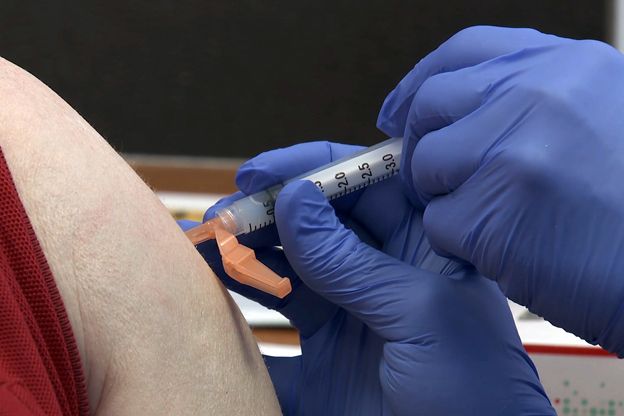
Various IU Health facilities have put restrictions in place to protect patients. (Joey Mendolia/WTIU News)
Hospitals across the state have added visitor restrictions amid a rise in flu, COVID-19 and other respiratory illness cases. The Centers for Disease Control and Prevention report that the level of respiratory illness in Indiana is high.
“We have people here getting surgery, people here who are with other ailments, who don't have a respiratory illness, and the last thing they need when they're ill already is to get an infection on top of that,” said John Sparzo, vice president and chief medical officer for IU Health Bloomington.
Various IU Health facilities have put restrictions in place to protect patients. Sparzo said hospitals decide when to do so based on how often people go to emergency departments with an influenza-like illness. He also looks at the number of people in respiratory isolation and test rates for COVID-19, the flu and RSV.
“When we made the decision to put the visitor guidelines update out there, it was really because we saw a rapid increase in respiratory isolation in our region,” he said. “So we felt it was time to move that trigger, even though, in the community, it hadn't reached our typical threshold.”
Read more: Wastewater tests show elevated flu, RSV, Norovirus levels in Monroe County
Visitors are limited around the holiday season, Sparzo said. Six IU Health hospitals in Indianapolis have been limiting visitors since Dec. 16: IU Health Methodist Hospital, IU Health University Hospital, Riley Hospital for Children, IU Health North Hospital, IU Health West Hospital and IU Health Saxony Hospital. Visitor restrictions for IU Bloomington Hospital, as well as hospitals in Bedford and Paoli, started Monday, Jan. 6.
“We being, you know, just an hour south, do have oftentimes different timing of the waves of respiratory infection, and that was the case here,” he said. “…Fortunately, we were able to hold off until after the holidays, which is great because the last multiple holidays seasons in a row, we've had to have visitor restrictions in place. So we were happy that things seem to stay calmer than they have in past years and let us get through the holidays.”
At the IU Bloomington Hospital, visitors may not come if they have respiratory symptoms and must be over age 18. Some units may have more stringent regulations, such as the intensive care and neonatal units. Exceptions may be made to let those under 18 in for special circumstances, such as end of life. Sparzo said this year, the biggest change to the restrictions is that visitors have to be over the age of 18. He said young children are less likely to be social distancing in class and can more easily transmit an illness. Being asymptomatic and still spreading a sickness is also a concern.
“Particularly younger children, unlike you and I, they may not have be as adept at noticing that they're starting to get sick,” he said. “They may not pay attention to a mild headache or a feeling of malaise and understand, ‘oh, that means I'm getting sick, I should tell somebody about it.’”
For the Indianapolis hospitals, only visitors over age 18 are allowed on patient units. Visitors who have flu-like or COVID-19 symptoms are not permitted. Riley Hospital for Children has additional restrictions: only six designated visitors are allowed in the maternity units for the entire stay. In a patient room, only two visitors over age 18 are allowed at a time. In patient units, only parents/legal guardians, as well as four additional adults approved by the parents/legal guardians, are allowed.
Read more: Hospitalizations increase as virus ‘trifecta’ spreads across state
Union Hospital in Terre Haute has had visitor restrictions in the neonatal intensive care unit since Oct. 21. A maximum of three visitors over age 18 are allowed at one time. Effective Jan. 2, the number of visitors is limited across other areas of Union Hospital Terre Haute and Union Hospital Clinton. Visiting hours are 6 a.m.-8 p.m. and visitors must be 18 or older.
Columbus Regional Health Hospital has also limited visitors to protect patients and staff from illnesses.
Restrictions will remain in place until cases decrease. Sparzo anticipates it will be several weeks before visitor regulations will go back to normal.











